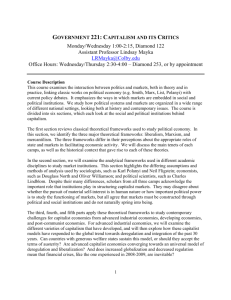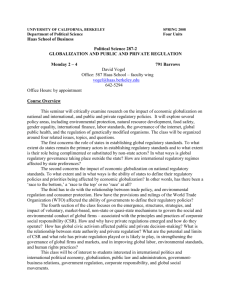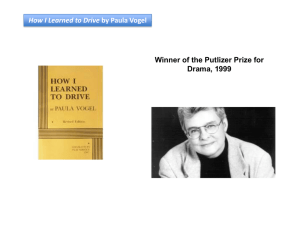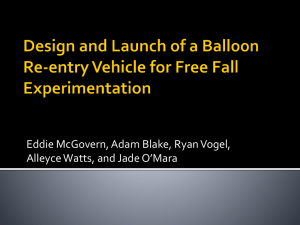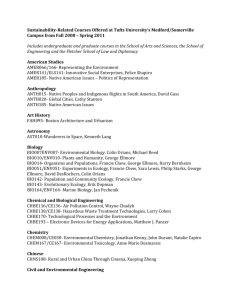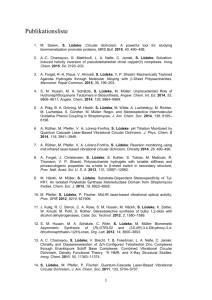the varieties of capitalism: the political
advertisement
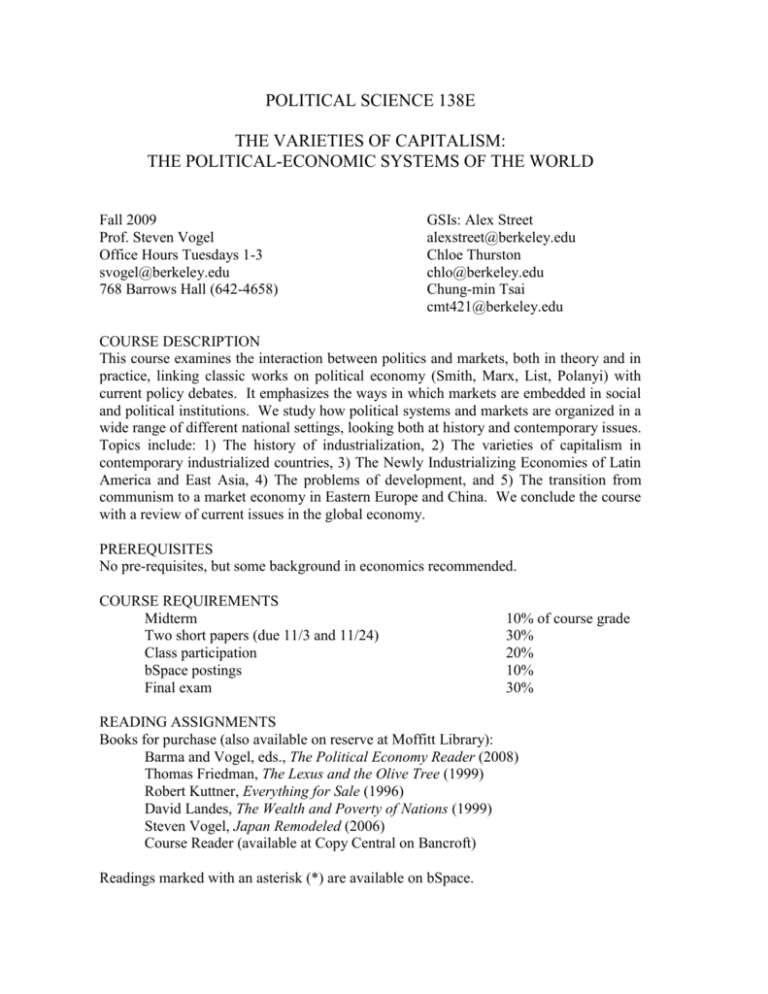
POLITICAL SCIENCE 138E THE VARIETIES OF CAPITALISM: THE POLITICAL-ECONOMIC SYSTEMS OF THE WORLD Fall 2009 Prof. Steven Vogel Office Hours Tuesdays 1-3 svogel@berkeley.edu 768 Barrows Hall (642-4658) GSIs: Alex Street alexstreet@berkeley.edu Chloe Thurston chlo@berkeley.edu Chung-min Tsai cmt421@berkeley.edu COURSE DESCRIPTION This course examines the interaction between politics and markets, both in theory and in practice, linking classic works on political economy (Smith, Marx, List, Polanyi) with current policy debates. It emphasizes the ways in which markets are embedded in social and political institutions. We study how political systems and markets are organized in a wide range of different national settings, looking both at history and contemporary issues. Topics include: 1) The history of industrialization, 2) The varieties of capitalism in contemporary industrialized countries, 3) The Newly Industrializing Economies of Latin America and East Asia, 4) The problems of development, and 5) The transition from communism to a market economy in Eastern Europe and China. We conclude the course with a review of current issues in the global economy. PREREQUISITES No pre-requisites, but some background in economics recommended. COURSE REQUIREMENTS Midterm Two short papers (due 11/3 and 11/24) Class participation bSpace postings Final exam 10% of course grade 30% 20% 10% 30% READING ASSIGNMENTS Books for purchase (also available on reserve at Moffitt Library): Barma and Vogel, eds., The Political Economy Reader (2008) Thomas Friedman, The Lexus and the Olive Tree (1999) Robert Kuttner, Everything for Sale (1996) David Landes, The Wealth and Poverty of Nations (1999) Steven Vogel, Japan Remodeled (2006) Course Reader (available at Copy Central on Bancroft) Readings marked with an asterisk (*) are available on bSpace. PART I: CONTENDING PERSPECTIVES ON POLITICAL ECONOMY Course Introduction (8/27) Smith (9/1) Barma and Vogel, 1-40, 87-116. Marx (9/3) Barma and Vogel, 41-62. * Leo Panitch, “Thoroughly Modern Marx,” Foreign Policy (May/June 2009), 140-45. List (9/8) Barma and Vogel, 63-86. Polanyi (9/10) Barma and Vogel, 117-51. Sociological Perspectives (9/15) Barma and Vogel, 153-70. The New Institutional Economics (9/17) Douglass North, Structure and Change in Economic History (1981), 3-32. Barma and Vogel, 171-94. Hirschman (9/22) Albert Hirschman, Rival Views of Market Society (1986), 77-141. Lindblom I: Systems of Control (9/24) Barma and Vogel, 239-58. Charles Lindblom, Politics and Markets (1977), 3-13, 144-57, 170-88, 201-21. Lindblom II: Markets and Democracy (9/29) Kuttner, 328-62. Milton Friedman, Capitalism & Freedom (1962), 7-21. MIDTERM (10/1) PART II: THE INDUSTRIALIZED COUNTRIES British Industrialization (10/6) Barma and Vogel, 195-98. Eric Hobsbawm, Industry and Empire (1968), 1-39. Landes, 186-230. Late Development (10/8) Barma and Vogel, 199-228. Landes, 256-75. The Varieties of Capitalism I: The Role of the State (10/13) * Baumol, Litan, and Schramm, Good Capitalism, Bad Capitalism (2007), 60-92 [Chapter 4]. * Robert Kuttner, “The Copenhagen Consensus,” Foreign Affairs (March/ April 2008), 78-94. * Harold Wilensky, “U.S. Health Care and Real Health in Comparative Perspective: Lessons From Abroad,” The Forum (2009). The Varieties of Capitalism II: Micro-Institutions (10/15) Barma and Vogel, 289-326. Kuttner, 159-90. The United States, Germany and Japan (10/20 and 10/22) Vogel, 1-21, 51-77, 143-56, 205-24. Regulation, Deregulation, and the Financial Crisis of 2008 (10/27 and 10/29) Barma and Vogel, 329-54. Kuttner, 225-39, 275-80. * Joseph Stiglitz, “Capitalist Fools,” Vanity Fair (January 2009). * Joseph Stiglitz, “Regulation and the Theory of Market and Government Failure” (April 2009). * Peter Wallison, “The True Origins of This Financial Crisis,” (February 2009), and “Too Big to Fail, or Succeed” (August 2009), On the Issues, American Enterprise Institute. PART III: THE DILEMMAS OF DEVELOPMENT Theories of Dependency (11/3) Peter Evans, Dependent Development (1979), 14-34. Andre Gunder Frank, "The Development of Underdevelopment," in Cockroft, Frank and Johnson, eds., Dependence and Underdevelopment (1972), 3-17. The Newly Industrializing Economies (11/5) * Peter Evans, Embedded Autonomy (1995), 43-73 [Chapter 3]. Landes, 525-31. Peter Gourevitch, “Containing the Oligarchs: The Politics of Corporate Governance Systems in East Asia,” in MacIntyre, Pempel, and Ravenhill, eds., Crisis As Catalyst (2008), 70-92. Development Strategies (11/10 and 11/12) Barma and Vogel, 425-82. Joseph Stiglitz, Globalization and Its Discontents (2002), 53-88. The World Bank, World Development Report 2002: Building Institutions for Markets (2002), 3-27. Landes, 512-24. * Ethan Kapstein, “Africa’s Capitalist Revolution,” Foreign Affairs (July/ August 2009), 119-28. * Jeffrey Sachs, “Helping Africa Help Itself,” Economist (June 30, 2005). * Willliam Easterly, “The Utopian Nightmare,” Foreign Policy (September/ October 2005), 58-64. What is Development? (11/17) * Amartya Sen, Development as Freedom (1999), 3-53 [Chapters 1-2]. E. F. Schumacher, Small is Beautiful (1973), 40-62, 163-70. PART IV: POST-COMMUNIST TRANSITION Eastern Europe (11/19) Barma and Vogel, 355-98. China (11/24) Barma and Vogel, 399-423. PART V: PROSPECTS FOR THE FUTURE Globalization (12/1) Barma and Vogel, 483-86, 525-46. T. Friedman, xi-xxii, 3-16, 101-11, 145-66, 276-305, 327-47. * Pankaj Ghemawat, “Why the World Isn’t Flat,” Foreign Policy (March/ April 2007), 54-58. The Information Revolution (12/3) Barma and Vogel, 505-23. T. Friedman, 44-89, 348-64. Course Review (12/8) bSPACE SITE Study questions, class outlines, and other resources are available on bSpace. KEEPING UP WITH THE NEWS In addition to the assigned readings for each week, students must keep up with current events by reading at least one quality newspaper and one news magazine on a regular basis. Recommended newspapers include the New York Times, the Financial Times, or the Wall Street Journal. Recommended magazines include the Economist, Fortune, the American Interest, the Atlantic, the National Review, the New Republic, or the Nation. You may choose foreign-language journals as well. You may also fulfill this assignment by checking Internet and newsgroup news sources regularly. In addition, you will be expected to read any news clips handed out in class or posted on bSpace. bSPACE POSTINGS (five postings, due 5 p.m. the afternoon before the relevant class) Write a one-paragraph memo (150 words maximum) on the readings for the day and post it to the course bSpace site Forum by 5 p.m. the afternoon before the relevant class. See the bSpace site under Forum for instructions on how to post a memo. We will discuss some of the memos in class. You should post your first memo by 9/15, and then post at least one memo every three weeks until you have completed all five. The memos may take a variety of forms: 1) Critique one or more of the readings, 2) Relate the readings to a recent news story or news commentary, 3) Write your own question on the readings and answer it, 4) Propose a topic for discussion that relates to the readings, 5) Answer one of the study questions. Do not summarize – you may assume that your classmates have done the readings. You are encouraged to experiment with this assignment: do not answer the study questions more than twice during the semester. You are also encouraged to post Free Discussion memos. There are no restrictions on the length of these postings. You may write about anything relevant to the course. For example: review a book or a movie, discuss a news article or opinion column, or debate policy issues. Free discussion memos do not count toward the quota of five postings on course readings, but they do count as one form of class participation. PRESS CRITIQUE PAPER (due before class 11/3) Write a 1500-word paper reviewing press coverage of a news story that has appeared since the course began. Discuss how any two authors from the course might offer insight on this particular news story. You may approach this in one of two ways. 1) Use the two authors to discuss the substance of the story. For example, how would Kuttner and Friedman shed light on the debate over energy regulation? How are their views similar/ different? What do you think? 2) Incorporate discussion of two or more authors in a critique of the coverage of the issue. For example, how do Smith and List shed light on the strengths and weaknesses of the press coverage of the debate over trade policy? Do you find any weaknesses in the coverage? How could the reporters do better? If you choose the second approach, make sure to cite multiple examples from specific news clips. COMPARATIVE PAPER (due before class 11/24) Write a 1500-word paper comparing and contrasting some aspect of the politicaleconomic systems of two countries. Rather than surveying everything, focus on a specific institution or set of institutions: for example, the labor relations system, the financial system, interfirm networks, the corporate governance system, the welfare system, or the regulatory system. Feel free to focus quite narrowly on one specific element of these systems: for example, wage bargaining, securities regulation, corporate board structure, unemployment insurance, or telecommunications regulation. This is not meant to be a full-fledged research paper. You should base your paper primarily on course readings plus news clips from this semester. Make sure to go beyond simply describing the differences between the two countries and to present an argument of your own. For your argument, for example, you might explain the differences between the two countries, or you might assess the consequences/ implications of those differences. Note: You should discuss your paper topics with the GSI or the instructor well in advance of the due date.

